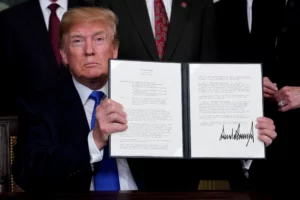As President Trump implements aggressive tariff policies aimed at various global partners, experts are predicting significant implications for international trade relations and domestic manufacturing.**
Trump's Bold Trade Strategy: A New Era of Tariffs and Global Tensions**

Trump's Bold Trade Strategy: A New Era of Tariffs and Global Tensions**
President Trump's renewed focus on tariffs is setting the stage for a potential upheaval in the global trading system.**
President Trump is adopting a remarkably bold trade strategy that signals a shift from his previous approach, employing aggressive tariffs that could alter the landscape of international commerce. With less than a month into his new term, Trump’s focus has turned towards utilizing the United States' market influence to challenge global trade norms in a manner unseen by past presidents.
His administration has openly threatened the imposition of substantial tariffs on imported goods from multiple countries, including major trading partners like Canada, Mexico, and China—with potential tariffs on over $1.3 trillion of imports. This strategy not only greatly expands the scale of tariffs compared to the previous term but also illustrates Trump’s reliance on a blend of instinct and confrontational negotiation tactics.
The president's recent proposal to globally reassess tariff rates emphasizes a reactive strategy aimed at aligning other nations' tariff structures with those of the United States. Dubbed “reciprocal tariffs,” this initiative is designed to impose tariffs reflective of those charged by other nations and also considers various subsidies granted to their local industries. This move represents an aggressive shift from international cooperative frameworks such as those overseen by the World Trade Organization (WTO) to a more unilateral decision-making process.
The implications of Trump's choice to prioritize urgency and immediate economic benefits could reshape longstanding international commitments, resulting in heightened unpredictability and volatility in global markets. Such aggressive tactics aim to bring about concessions across various issues beyond trade, including immigration policies and drug enforcement.
However, while some analysts suggest that part of Trump's rhetoric may serve as a negotiating strategy, the president's supporters argue that these tariffs have become essential for reversing decades of manufacturing decline in the U.S. and addressing job losses. The outcome of these policies remains to be seen, but the potential for trade conflicts and global economic shifts could be significant.





















